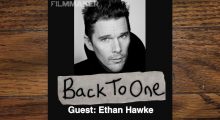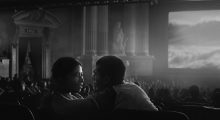First Reformed
-
The 2010s in 10 Double Features

“I can’t commit to a movie.” In the era of limitless streaming “content,” no phrase has more irrevocably warped our viewing habits. If a single film now represents a commitment, then a double feature might as well be a back-to-back life-sentence. Why trudge through all that first-act boredom, after all, when you’re already so behind on The Good Place? Despite the siren song of bingeable TV, the dual bill holds strong as a way to burn a night at the movies. Art-house theaters, digital programmers, and genre festivals still love them, as does any cinephile looking to hunker down with […]
by Soheil Rezayazdi on Dec 30, 2019 -
Back to One, Episode 41: First Reformed‘s Ethan Hawke

Ethan Hawke’s “staying power” is grounded in hard work. He survived being the poster child of Generation X (Reality Bites), and thrived as Richard Linklater’s go-to actor (The Before Trilogy, Boyhood) and always returns to the true home of the actor–the theater (he’s currently starring in True West on Broadway). Now he has delivered one of the most critically acclaimed performances of the year in Paul Schrader’s First Reformed. He generously shares the wisdom and knowledge he’s acquired over the years as an actor, and is extremely eloquent when doing so. In this episode, he talks about the importance of […]
by Peter Rinaldi on Jan 15, 2019 -
2018 As a Year in Double Features

Every year, when looked back upon in its final days, reveals patterns. For the past four years, I’ve capped the holiday season with a list of 10 double features from the year in film here at Filmmaker. Each capsule review is, in essence, a mini-thinkpiece on a cinematic trend from the year. This past year gave us many such boomlets: the year of the horse movie, the year of the “white voice” movie, the year of the movie set entirely on digital screens. A delightful interplay emerges when you watch, or think about, films in pairs. One movie brings out […]
by Soheil Rezayazdi on Dec 31, 2018 -
Buddies, Bound and First Reformed: Jim Hemphill’s Weekend Blu-ray Recommendations

One year before the release of Parting Glances and four before Longtime Companion, Arthur Bressan Jr. wrote, produced, directed and edited Buddies (1985), one of the first narrative feature films to put AIDS front and center as a subject. It might be the first, but the television movie An Early Frost aired at around the same time, and in any case, I’ve learned not to make claims for anything being the absolute first when it comes to film history since there are inevitably obscurities that elude even a guy like me who spends every waking hour watching and thinking about […]
by Jim Hemphill on Aug 24, 2018 -
Committed to Paper: Writer/Director Paul Schrader on First Reformed

With Paul Schrader’s First Reformed, which has topped many critics’ lists so far this year, on iTunes today, we’re unlocking from our paywall Darren Hughes’s interview with the writer/director from our Summer print edition. When discussing his latest film, First Reformed, Paul Schrader regularly recounts a conversation he had over dinner with the Polish filmmaker Pawel Pawlikowski. Schrader, who famously discovered cinema as a college student after coming of age in a strict Calvinist home, has very intentionally spent his career exploring darker, more transgressive aspects of the spiritual condition. He was intrigued, however, by Ida, Pawlikowksi’s quiet, black-and-white study […]
by Darren Hughes on Jul 31, 2018 -
Five Questions for First Reformed Director Paul Schrader

Paul Schrader returns to form with a deeply introspective film, First Reformed, which, following screenings in Venice, Telluride and Toronto, screens tonight at the New York Film Festival, where it was a late addition to the program. The writer of films including Taxi Driver and Raging Bull and director of films including American Gigolo and Affliction delivers a new work that both contains echoes of his previous pictures depicting “God’s Lonely Men” while also being quite unlike anything he’s ever done. (Plus, argues Vadim Rizov, something of a treatise on the role of Slow Cinema today.) Ethan Hawke stars as a former […]
by Ariston Anderson on Oct 6, 2017 -
First Reformed: Paul Schrader vs. Slow Cinema

In an interview in March, Paul Schrader questioned the ongoing usefulness of Slow Cinema. “It had a real interesting moment in the last 10 years, but now the novelty has worn off, and people are not as mesmerized as they were when the slowness was really being used as a new concept of film time,” he said. “It’s a dead end. […] There are still bits of transcendental style. It was a precursor to slow cinema, but it’s not really that slow. A terrific film like Silent Light is closer to transcendental style than slow cinema, but they lump it in […]
by Vadim Rizov on Aug 30, 2017
